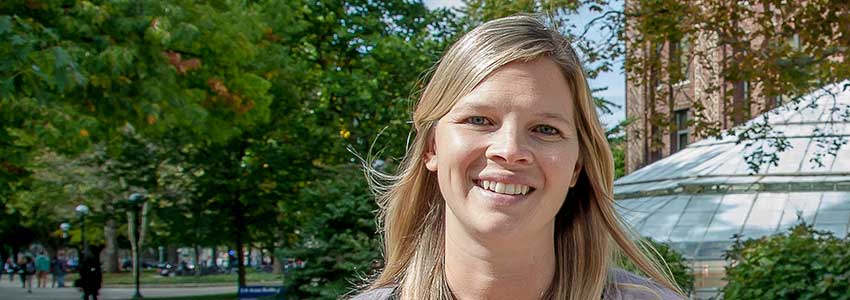Alison studies a bioluminescent symbiosis between the coral reef cardinalfish and a luminous bacterium that the fish houses in a specialized light organ. “Understanding how specificity arises and is maintained in such symbioses is especially important now, as changes in the marine environment, such as increases in sea surface temperature and acidification, are occurring more rapidly. These changes have the potential to de-couple symbiotic associations by altering the ecology of both organisms.”
As she explains the behavior of the cardinalfish, she says, “They are an amazing species. The fish, approximately two centimeters long, uses the bacterially-produced light to forage for food near the reef at night. During the daytime, the fish remains in groups among the protective spines of longspined sea urchins. They are also paternal mouth brooders – the male fish carry and provision the embryos in their mouths through development.”
The coral reef fish is an Indo-Pacific species, so Alison’s research takes place in Okinawa, Japan where the fish are abundant, and she and her faculty advisor have established collaborations. “There are so many questions about the behavioral ecology of these fish: Do they come back to the same sea urchin daily? Do they have a home reef site? How is the symbiosis maintained over time? All of this gives us insight into other symbiotically luminous fish species that we can’t study as well.” Many bioluminescent fish are found in the deep or open ocean and are thus difficult to study in their natural environments. “There are over 450 fish that host luminous bacteria, but this is one of the few found in coral reefs, which makes them much easier to study in nature. Therefore, we can use this fish as a model for examining specific symbioses between fish and bacterium.”
Her work includes a genetics component, examining how this specific relationship is genetically structured over geographic scales, looking for overlap in spatial patterns of the population genetics of the fish and the symbiont, which will provide insight on how the symbiosis is maintained between generations of the host fish. While her dissertation is quite focused on the specific symbiosis she studies, she takes a higher-level view on the importance of marine research. “It creates an understanding for organisms in environments that most people don’t ever get to see, let alone study. The intricacies of the marine environment and what people don’t know about it – I want to bridge this gap between the general knowledge of our oceans and the science behind it.”
During her Master’s in Marine Biology at San Francisco State University, Alison studied aspects of the food web in the San Francisco Estuary. “I wanted a Ph.D. program with a more diverse curriculum that could provide me with a broader perspective when thinking of my own research. I looked at the faculty in our department and found Paul Dunlap, my advisor. He was so passionate about his work and had a ‘the sky’s the limit’ attitude toward my research. I’ve also been very impressed with the quality of people here – the graduate students in our department are so intelligent and are from all over the world. I’ve made lifelong friends here.”
Continuing to do marine research is her ultimate goal. This native Californian who completed her undergraduate degree at the University of Virginia would like to get back to one of the coasts at some point.

